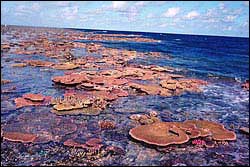Oceanic acidity

This exposed reef, known as John Brewer Reef, part of the Great Barrier Reef in Australia, is a good example of how living reefs provide shoreline protection. (1981)
Researcher outlines coral’s future in an increasingly acidic ocean
The ocean is getting more and more acidic, and that’s bad news for coral reefs. That’s the word from University of Miami Rosenstiel School’s Dr. Christopher Langdon who will speak on “Possible Consequences of Increasing Atmospheric CO2 on Coral Reef Ecosystems,” Monday, Feb. 20 at 3 p.m. HST (8 p.m. EST) in Honolulu at the American Geophysical Union’s 2006 Ocean Sciences Meeting.
“While we focus a great deal of attention on rising ocean temperatures and the bleaching incidents they cause in corals, we tend to overlook the other consequence of rising atmospheric carbon dioxide on our corals: decreases in ocean pH,” Langdon said. “Carbon dioxide in the ocean is creating a growingly acidic environment for corals, and this acidity could ultimately cause our reefs to waste away.”
Rising levels of atmospheric carbon dioxide are causing the climate to warm and the oceans to become more acidic. Studies suggest that 20th century warming of approximately 0.6°C may have been beneficial to the growth of some corals and as a result masked the negative effects of declining ocean pH. However, at some point water temperatures will exceed the thermal optimum for corals and when that happens both rising temperature and falling ocean pH will have a mutually reinforcing, negative effect on the ability of corals to build their calcium carbonate skeletons. Results from controlled laboratory experiments suggest that a doubling in atmospheric carbon dioxide could drive production of carbonate on many reefs below what is needed to replace skeletal damage from natural erosive forces.
Langdon is the associate director of the National Center for Caribbean Coral Reef Research and an assistant professor in marine biology and fisheries at the University of Miami Rosenstiel School of Marine and Atmospheric Science. His presentation is part of a session titled, Observations of Anthropogenic Climate Change in the Oceans and their Implications for Society II: Arctic and Ecosystem Responses. Dr. Rana A. Fine, also a UM Rosenstiel School faculty member, will preside over the session with Dr. Richard Feely from NOAA’s Pacific Marine Environmental Laboratory.
Rosenstiel School is part of the University of Miami and, since its founding in the 1940s, has grown into one of the world’s premier marine and atmospheric research institutions.
Media Contact
More Information:
http://www.rsmas.miami.eduAll latest news from the category: Earth Sciences
Earth Sciences (also referred to as Geosciences), which deals with basic issues surrounding our planet, plays a vital role in the area of energy and raw materials supply.
Earth Sciences comprises subjects such as geology, geography, geological informatics, paleontology, mineralogy, petrography, crystallography, geophysics, geodesy, glaciology, cartography, photogrammetry, meteorology and seismology, early-warning systems, earthquake research and polar research.
Newest articles

How marine worms regenerate lost body parts
The return of cells to a stem cell-like state as the key to regeneration. Many living organisms are able to regenerate damaged or lost tissue, but why some are particularly…

Nano-scale molecular detective
New on-chip device uses exotic light rays in 2D material to detect molecules. Researchers have developed a highly sensitive detector for identifying molecules via their infrared vibrational “fingerprint”. Published in Nature…

Novel CAR T-cell therapy
… demonstrates efficacy and safety in preclinical models of HER2-positive solid tumors. The p95HER2 protein is found expressed in one third of HER2+ tumors, which represent 4% of all tumors….



